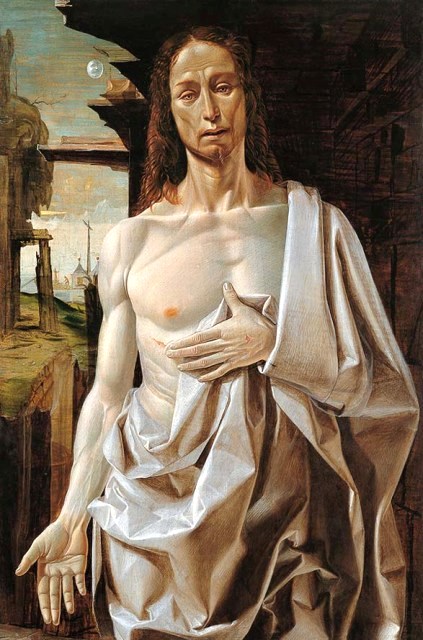
To view the Lectionary readings for Easter, you can go to the USCCB website here and select them from the calendar.
The outline below is based on the Homiletic Directory’s second group of Catechism points with the theme: “Easter, the Lord’s Day” (CCC 647, 1167-1170, 1243, 1287). In this outline I will focus just on doctrinal and practical points.
Doctrine: Easter, the Lord’s Day
- The Resurrection of Jesus Christ from the dead is an historical event, verified by the empty tomb, the eyewitness accounts, and the transformation of the Apostles.
- Yet the moment of the Resurrection was hidden from all human eyes. In addition, we do not know “how it came about physically” and we do not know “its innermost essence.” (CCC 647)
- The Resurrection “remains at the very heart of the mystery of faith as something that transcends and surpasses history. This is why the risen Christ does not reveal himself to the world, but to his disciples, ‘to those who came up with him from Galilee to Jerusalem, who are now his witnesses to the people’” (CCC 647).
- The Catechism says that the risen Christ showed himself to his disciples but not the whole world because his resurrection “transcends and surpasses history.”
- Christ evidently wants this most important truth in the history of the human race to be passed on from person to person: from Himself, to his disciples, to their disciples, down the ages. God likes mediators, which are what witnesses are.
- Christ’s people gather every Sunday “to listen to the word of God and take part in the Eucharist” because Sunday is the day Christ rose from the dead, thus giving us “a living hope” of our own eternal salvation. (CCC 1167)
- We are living in “a year”—really an epoch—“of the Lord’s favor” (Lk 4:19). “The economy of salvation,” that is, God’s plan and method of humanity’s redemption, is now “at work within the framework of time” (CCC 1168). In other words, we have reached the last period of human history, the time of God’s favor to all human beings, which began with the founding of the Church,
- Because Easter Sunday is the commemoration of Christ’s Resurrection, this day is the greatest solemnity of the liturgical year (CCC 1169).
- Just as “the white garment symbolizes that the person baptized has ‘put on Christ,’” the Easter candle signifies that in Christ we are “the light of the world.” Now as children of God, we can call God, “Our Father.” (CCC 1243)
- Not only are we brothers of Christ the Son of God and children of God the Father, we have also received the outpouring of the Holy Spirit (cf. Ezek 36:25-27; Joel 3:1-2). (CCC 1287)
Practical application: Walking with the Holy Spirit
- We are rightly happy about the Resurrection of Christ because of what it does for us. The supreme miracle of Christ’s Resurrection, witnessed by his disciples, is the definitive proof that all he taught—through his words, deeds, and very person—is true.
- The Catechism cites two prophesies about the outpouring of the Holy Spirit. These are supernaturally inspired predictions that have come true in us. One is by the Prophet Ezekiel, the other by the Prophet Joel.
I will sprinkle clean water upon you, and you shall be clean from all your uncleannesses, and from all your idols I will cleanse you. A new heart I will give you, and a new spirit I will put within you; and I will take out of your flesh the heart of stone and give you a heart of flesh. And I will put my spirit within you and cause you to walk in my statutes and be careful to observe my ordinances. (Ez 36:25-27)
And it shall come to pass afterward, that I will pour out my spirit on all flesh; your sons and your daughters shall prophesy, your old men shall dream dreams, and your young men shall see visions. Even upon the menservants and maidservants in those days, I will pour out my spirit. (Joel 2:28-29)
- The Christian life, given to us by Christ’s Word and Sacraments, and mediated through the Church He founded, is to be for us a progressive growth in living in a new way.
- This is a way of being cleaned of sin by the waters of Baptism and the words of Confession.
- It is living according a heart of flesh (not stone), through charity or agape.
- It is being guided in our actions to do the good will of God by the enlightenment of the Holy Spirit.
- This is an exciting way to live. It means always being young with ever-new discoveries of God’s goodness and of how to participate in that goodness. This new way of living, the way of being led by the Holy Spirit, lets us see what we should do and helps us do it.
- This way is not just for our own benefit. If we are now “the light of the world,” that light is for others to see by.
The Homiletic Directory offers the following Catechism points and themes for Easter Sunday of the Resurrection of the Lord:
- CCC 638-655, 989, 1001-1002: the Resurrection of Christ and our resurrection
- CCC 647, 1167-1170, 1243, 1287: Easter, the Lord’s Day
- CCC 1212: the Sacraments of Initiation
- CCC 1214-1222, 1226-1228, 1234-1245, 1254: Baptism
- CCC 1286-1289: Confirmation
- CCC 1322-1323: Eucharist
Leave a Reply